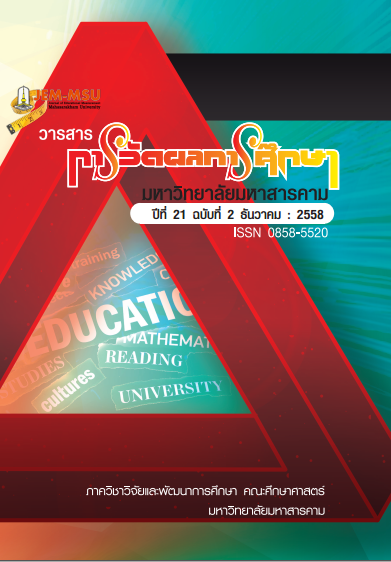Monitoring and Evaluation of Area-Based Education Management Project of Mathayom Suksa 1 in Sisaket Primary Educational Service Area Zone 3
Main Article Content
Abstract
The purpose of this project were to evaluate the operation, problems
and obstacle to the operation according to the project purposes in the annual
academic year 2012, To evaluate this task using Tyler’s evaluation form. The
sample consisted of 288 people from 6 schools to involving the Area-Based
Education Management of Mathayom Suksa 1 in The Office of Sisaket Primary
Educational Service Area Zone 3. The manger of 18, the backer of 90 and the
user of 180. The Instruments used for collecting data consisting of questionnaires,
interviews, observations and student’s evaluation form. The Questionnaires were
5-rating-scales, There were 3 sets, Questionnaire 1 were 64 items for The manager.
Questionnaire 2 were 50 items for the backer. Questionnaire 3 were 54 items
for the user with discriminating powers (rxy) ranging .31-.94 and a reliability of .96-.98.
The Interviews were structured-interview forms, There were 3 sets, Interviews 1
were 8 items for The manager. Interviews 2 were 6 items for The backer. Interviews 3
were 7 items for The user. The structured-observation forms, There were 20 items.
The Students’s Evaluation of job form, There were 8 items. The Statistics are used
Percentage, Means and Standard Deviation.
The results of the study were as follows;
1. Results of Evaluation of Area-Based Education Management.
1.1The manager have planning to developed for confiscate, the Parents
participated in the project at high level. Students have skill on the job at high
level. Students can earn during study at moderation level.
1.2 The backer have planning to developed for confiscate at
moderation level.
1.3 The user have planning to developed for confiscate at high
level. Students can earn from this project at moderation level.
2. Problems, obstacles, and recommendations
2.1 The problems and obstacles found included: The Parents
work in another province, Students don’t living with the parents, Committee
on Basic Education and Parents do not understand their roles, Coordination
between the community and related organizations are low level, Joint planning
between Committee on Basic Education and Parents is not continued, Budget
support is not sufficient.
2.2 Recommendations about the project included: Supporting budgets
for operation according to the project should be increased for the schools which
participated to the project in order to underlie or to organize according to the project
purposes. Meeting should be held regularly to find out the model and method for
administrators and people involved to understand the same thing. Schools and
departments or related organizations should have a record deal together (MOU)
regarding the support resources. Personnel in project implementation. The
administrators and responsible person at the Area-Based Education Management
should give more importance and more earnestly to the project than the current.
There should be continuous follow-up and evaluation.
Article Details
The content and information contained in the published article in the Journal of Educational Measurement Mahasarakham University represent the opinions and responsibilities of the authors directly. The editorial board of the journal is not necessarily in agreement with or responsible for any of the content.
The articles, data, content, images, etc. that have been published in the Journal of Educational Measurement Mahasarakham University are copyrighted by the journal. If any individual or organization wishes to reproduce or perform any actions involving the entirety or any part of the content, they must obtain written permission from the Journal of Educational Measurement Mahasarakham University.


